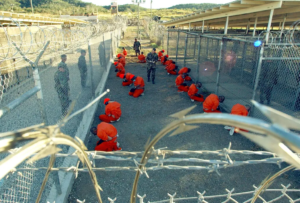By Tanmay Gupta

When one thinks of Cuba in a legal sense, the most notable thing that comes to mind is the Cuban Embargo.[1] But there is a particularly American issue related to Cuba: Guantanamo Bay.[2] Guantanamo Bay has technically been American soil since 1903 and is now the home of a military prison camp that houses “enemy combatants” as a result of the War on Terror.[3] The U.S. has a permanent lease that can only be terminated by the “mutual consent of both parties.”[4] Therefore, for legal purposes, Guantanamo Bay de facto qualifies as United States territory,[5] although Cuba has legal sovereignty over the territory.[6]
But what of the legal status of the prisoners of Guantanamo Bay? Originally, these prisoners were considered enemy combatants held in a foreign territory, which meant, to the Bush administration, they did not have U.S. legal protections of any sort.[7] Because Cuba had legal sovereignty over the territory, the President argued that America did not have the jurisdiction to apply its laws to the prisoners.[8] Furthermore, because they were enemy combatants, they did not qualify as prisoners of war under the Geneva Convention and therefore had no standing to allege any rights.[9] Thus, habeas corpus did not apply to the prison.[10] The Supreme Court held that while their status was something best left to the executive branch, Guantanamo Bay qualified as United States territory for the purposes of legal rights, and therefore, the prisoners had a right to petition for their legal rights.[11]
While the Supreme Court seemed to have created a precedential ruling, lower courts are often hesitant to grant habeas corpus review to enemy combatants located in Guantanamo.[12] The Supreme Court has not considered the issue since 2008, leaving many lower court rulings in place that deny a hearing on habeas corpus review for these prisoners.[13] In fact, in 2020, the DC Court of Appeals denied a habeas corpus review for a Guantanamo Bay prisoner.[14]
So what are the legal rights for the people left in Guantanamo Bay? This is unclear because of the conflicting rulings. The Biden Administration has not been clear on their position,[15] and this has caused frustration for the lawyers in Guantanamo Bay who are attempting to try individuals for crimes related to Al-Qaeda.[16] Whatever side one takes on the issue, it is necessary to have clarity to avoid confusion and leaving these prisoners in limbo, things that are required to have a functional and understandable legal system. Unfortunately, for this matter, clarity is not likely anytime soon.
[1] See U.S. Dept. of State, Cuba Sanctions, https://www.state.gov/cuba-sanctions/ (accessed Jan. 19, 2023).
[2] See Lily Rothman, Why the United States Controls Guantanamo Bay, Time Magazine (Jan. 22, 2015), https://time.com/3672066/guantanamo-bay-history/.
[3] See id.
[4] See id.
[5] Boumedine v. Bush, 553 U.S. 723, 755 (2008).
[6] Id at 726.
[7] Id at 727.
[8] Id.
[9] Id at 734.
[10] Id.
[11] Id at 798.
[12] See Warren Richey, Supreme Court Deals Blow to Guantanamo Prisoners Challenging their Decision, The Christian Science Monitor (June 11, 2012), https://www.csmonitor.com/USA/Justice/2012/0611/Supreme-Court-deals-blow-to-Guantanamo-prisoners-challenging-their-detention.
[13] See Id.
[14] Carol Rosenberg, Court Rules Guantanamo Bay Detainees are not Entitled to Due Process, The New York Times (Sep. 2, 2020), https://www.nytimes.com/2020/09/02/us/politics/guantanamo-detainees-due-process.html.
[15] See Joe Biden’s Silence on Guantanamo Bay Frustrates Closure Advocates as Prison turns 20, PBS (Jan. 10, 2022), https://www.pbs.org/newshour/politics/joe-bidens-silence-on-guantanamo-bay-frustrates-closure-advocates-as-prison-turns-20.
[16] Carol Rosenberg, Sept. 11 Case Awaits Biden’s Reply on Plea Deal, The New York Times (Oct. 23, 2022), https://www.nytimes.com/2022/10/23/us/politics/sept-11-gitmo-terrorism.html.
